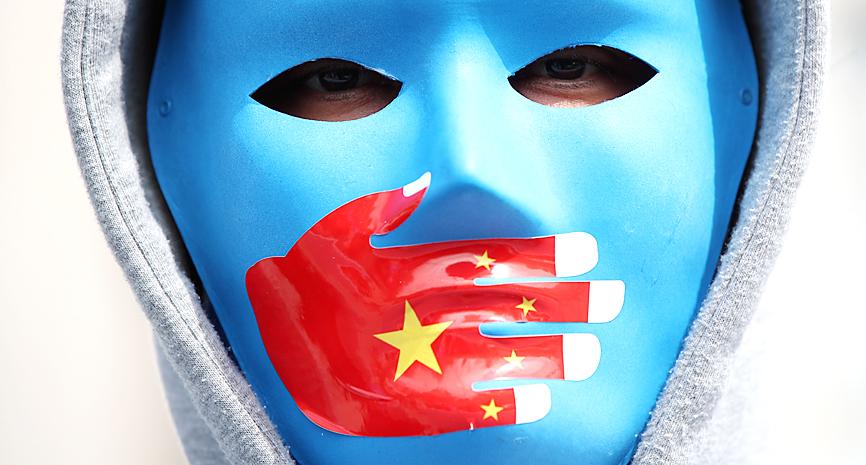A new state-produced musical set in Xinjiang inspired by Hollywood blockbuster La La Land has hit China’s cinemas, portraying a rural idyll of ethnic cohesion devoid of repression, mass surveillance and even the Islam of its majority Uighur population.
China is on an elaborate public relations offensive to rebrand the region where the US says “genocide” has been inflicted on the Uighurs and other Muslim minorities.
As allegations of slavery and forced labor inside Xinjiang’s cotton industry draw renewed global attention, inside China, Beijing is curating a very different narrative for the troubled region.

Photo: EPA-EFE
Rap songs, photographic exhibitions and a musical — The Wings of Songs (歌聲的翅膀) — are leading the cultural reframing of the region, while a legion of celebrities have seemingly unprompted leaped to the defense of Xinjiang’s tarnished textile industry.
Beijing denies all allegations of abuses and has instead recast Xinjiang as a haven of social cohesion and economic renewal that has turned its back on years of violent extremism thanks to benevolent state intervention.
The movie, whose release was reportedly delayed by a year, focuses on three men from different ethnic groups dreaming of the big time as they gather musical inspiration across cultures in the snow-capped mountains and desertscapes of the vast region.
State-run Global Times reported that overseas blockbusters such as La La Land have “inspired Chinese studios” to produce their own domestic hits.
However, the musical omits the surveillance cameras and security checks that blanket Xinjiang.
Also noticeably absent are references to Islam — despite more than half of the population of Xinjiang being Muslim — and there are no mosques or women in veils.
In one scene, a leading character, a well-shaven Uighur, toasts with a beer in his hand.
At least 1 million Uighurs and other mostly Muslim groups have been held in camps in Xinjiang, according to right groups, where authorities are also accused of forcibly sterilizing women and imposing forced labor.
That has enraged Beijing, which at first denied the existence of the camps and then defended them as training programs.
Last month, China swiftly closed down the Clubhouse app, an audio platform where uncensored discussions briefly flowered including on Xinjiang, with Uighurs giving unvarnished accounts of life to attentive Han Chinese guests.
The public relations push on Xinjiang aims at controlling the narrative for internal consumption, says Larry Ong, a senior analyst at US-based consultancy SinoInsider.
Beijing “knows that a lie repeated a thousand times becomes truth,” he said.
To many Chinese, that messaging appears to be working.
“I have been to Xinjiang and the film is very realistic,” one moviegoer said after seeing The Wings of Songs in Beijing.
“People are happy, free and open,” he said, declining to give his name.
Last week, celebrities, tech brands and state media — whipped up by outrage on China’s tightly controlled social media — piled in on several global fashion brands who have raised concerns over forced labor and refused to source cotton from Xinjiang. Sweden’s H&M was hit the worst.
The pushback has taken on a pop culture edge, with a rap released this week castigating “lies” by the “Western settlers” about cotton from the region, while state broadcaster CGTN is set to release a documentary on the unrest that prompted the Beijing crackdown.
It is impossible to gain unfettered access to Xinjiang, with foreign media shadowed by authorities on visits.

Drug lord Jose Adolfo Macias Villamar, alias “Fito,” was Ecuador’s most-wanted fugitive before his arrest on Wednesday, more than a year after he escaped prison from where he commanded the country’s leading criminal gang. The former taxi driver turned crime boss became the prime target of law enforcement early last year after escaping from a prison in the southwestern port of Guayaquil. Ecuadoran President Daniel Noboa’s government released “wanted” posters with images of his face and offered US$1 million for information leading to his capture. In a country plagued by crime, members of Fito’s gang, Los Choneros, have responded with violence, using car

Two former Chilean ministers are among four candidates competing this weekend for the presidential nomination of the left ahead of November elections dominated by rising levels of violent crime. More than 15 million voters are eligible to choose today between former minister of labor Jeannette Jara, former minister of the interior Carolina Toha and two members of parliament, Gonzalo Winter and Jaime Mulet, to represent the left against a resurgent right. The primary is open to members of the parties within Chilean President Gabriel Boric’s ruling left-wing coalition and other voters who are not affiliated with specific parties. A recent poll by the

TENSIONS HIGH: For more than half a year, students have organized protests around the country, while the Serbian presaident said they are part of a foreign plot About 140,000 protesters rallied in Belgrade, the largest turnout over the past few months, as student-led demonstrations mount pressure on the populist government to call early elections. The rally was one of the largest in more than half a year student-led actions, which began in November last year after the roof of a train station collapsed in the northern city of Novi Sad, killing 16 people — a tragedy widely blamed on entrenched corruption. On Saturday, a sea of protesters filled Belgrade’s largest square and poured into several surrounding streets. The independent protest monitor Archive of Public Gatherings estimated the

Irish-language rap group Kneecap on Saturday gave an impassioned performance for tens of thousands of fans at the Glastonbury Festival despite criticism by British politicians and a terror charge for one of the trio. Liam Og O hAnnaidh, who performs under the stage name Mo Chara, has been charged under the UK’s Terrorism Act with supporting a proscribed organization for allegedly waving a Hezbollah flag at a concert in London in November last year. The rapper, who was charged under the anglicized version of his name, Liam O’Hanna, is on unconditional bail before a further court hearing in August. “Glastonbury,